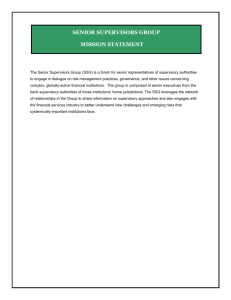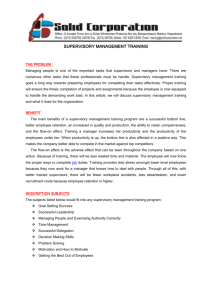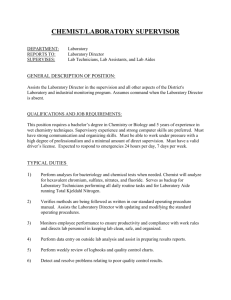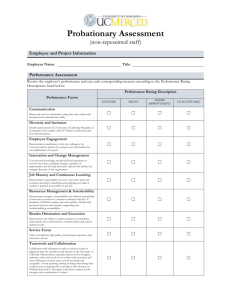appendixbperformanceeval_landscape
advertisement
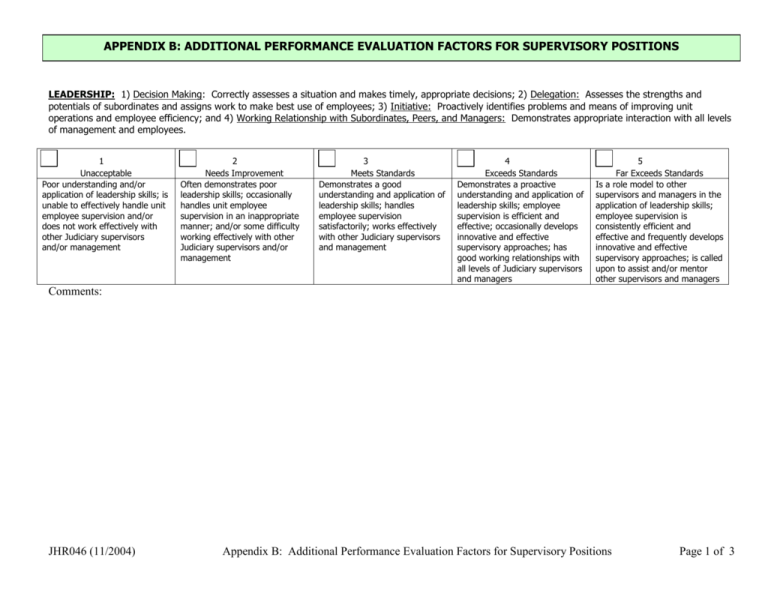
APPENDIX B: ADDITIONAL PERFORMANCE EVALUATION FACTORS FOR SUPERVISORY POSITIONS LEADERSHIP: 1) Decision Making: Correctly assesses a situation and makes timely, appropriate decisions; 2) Delegation: Assesses the strengths and potentials of subordinates and assigns work to make best use of employees; 3) Initiative: Proactively identifies problems and means of improving unit operations and employee efficiency; and 4) Working Relationship with Subordinates, Peers, and Managers: Demonstrates appropriate interaction with all levels of management and employees. 1 Unacceptable Poor understanding and/or application of leadership skills; is unable to effectively handle unit employee supervision and/or does not work effectively with other Judiciary supervisors and/or management 2 Needs Improvement Often demonstrates poor leadership skills; occasionally handles unit employee supervision in an inappropriate manner; and/or some difficulty working effectively with other Judiciary supervisors and/or management 3 Meets Standards Demonstrates a good understanding and application of leadership skills; handles employee supervision satisfactorily; works effectively with other Judiciary supervisors and management 4 Exceeds Standards Demonstrates a proactive understanding and application of leadership skills; employee supervision is efficient and effective; occasionally develops innovative and effective supervisory approaches; has good working relationships with all levels of Judiciary supervisors and managers 5 Far Exceeds Standards Is a role model to other supervisors and managers in the application of leadership skills; employee supervision is consistently efficient and effective and frequently develops innovative and effective supervisory approaches; is called upon to assist and/or mentor other supervisors and managers Comments: JHR046 (11/2004) Appendix B: Additional Performance Evaluation Factors for Supervisory Positions Page 1 of 3 HUMAN RESOURCES MANAGEMENT: 1) Staffing and Recruitment: Selects qualified and appropriate new employees through effective recruitment, interviewing and selection. Coordinates employee coverage and employee leave utilization to maintain efficient unit operations, 2) Employee Development and Training: Effectively trains new employees and/or introduces new policies, procedures, and operations to unit employees; identifies employee training needs and plans for and provides appropriate training opportunities. Recognizes individual employee potential and encourages/provides opportunities for employee growth and career development, and 3) Employee Relations Management: Manages employee performance, interaction, and discipline appropriately; uses and completes employee performance evaluation and counseling. 1 Unacceptable Selection, training and development of employees is frequently inadequate; employees are unqualified and/or unprepared for completion of unit operations and services; employee shortages occur which could have been anticipated and covered; employee management is ineffective; ineffectively disciplines and/or handles employee interactions; does not complete performance evaluations appropriately JHR046 (11/2004) 2 Needs Improvement Some aspects of human resources management are inadequate and/or inappropriate; employee mishandling of assigned work is a direct consequence of inadequate training and development; office coverage is sometimes inadequate; little or no attention given to developing employee potential; occasional instances of inappropriate or inadequate employee management and/or insufficient completion of employee performance evaluations 3 Meets Standards Selection, training and development of employees is effective and unit employees are assigned duties commensurate with their skills, abilities and potential; assures adequate office coverage; keeps employees informed and prepares employees for changes; employees receive appropriate training and development opportunities. Employee management is within acceptable bounds, employee interaction and discipline handled appropriately and employee performance evaluation is satisfactory 4 Exceeds Standards Demonstrates a good understanding of effective employee selection, training, and development; employees are well prepared to handle most situations; office coverage is handled efficiently; employee management is handled smoothly; problems with employee interaction and/or discipline are identified and resolved early; and employee performance evaluations provide good insights into individual needs and potential 5 Far Exceeds Standards Is called upon by senior management to provide training and/or mentoring to other supervisors and managers in effective human resources management; demonstrates innovative and highly successful employee development and training techniques; has excellent employee management skills even with the most difficult individuals; problems are identified and resolved early and frequently result in improved unit morale and motivation; performance evaluations are handled in an exemplary manner Appendix B: Additional Performance Evaluation Factors for Supervisory Positions Page 2 of 3 ADMINISTRATION: 1) Forecasting and Planning: Recognizes emerging trends that will affect unit operations and develops short and long-term plans to ensure unit continues to operate effectively within existing and emerging organizational and/or legal environment, 2) Organization: Designs and coordinates unit operations and employee activities efficiently, and 3) Organizational Involvement and Commitment: Recognizes the contribution of the unit to the overall missions of the organization; and develops and manages the unit appropriately. 1 Unacceptable Lack of understanding of the role of the unit within the overall organization and/or local office/court structure; does not appropriately organize and administer unit operations and/or plan unit operations and employee activities JHR046 (11/2004) 2 Needs Improvement Aspects of administration are insufficient; may demonstrate one or a combination of inadequate or inefficient planning, unit organization, or unit operations coordination skills 3 Meets Standards Administers unit operations efficiently and effectively; makes plans and structures unit consistent with overall organization and/or local office workflow/operations 4 Exceeds Standards Effectively plans and administers unit operations; smoothly integrates changes with minimal disruption; strives to ensure unit procedures, operations and effectively addresses the needs and requirements of the Judiciary 5 Far Exceeds Standards Develops unit forecasts, plans, structure, procedures and/or operations that can be used as a model for other units; is seen by peers and superiors as highly qualified to participate in and/or contribute to studies and pilots of new organizational approaches Appendix B: Additional Performance Evaluation Factors for Supervisory Positions Page 3 of 3
